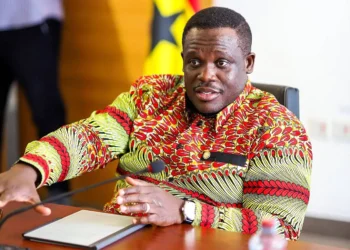In a statement on his Facebook wall, the Minister of Energy, Dr. Matthew Opoku Prempeh, made it clear that nuclear energy is crucial to Ghana’s energy security in the medium to long term. This declaration underscores Ghana’s commitment to addressing its growing energy demands and ensuring a stable energy supply for its people.
“I therefore continue to hold productive discussions with key stakeholders in this direction. I held engagements earlier today, with the Director General of the Nuclear Energy Agency, Mr. William D Magwood,” the energy minister said, demonstrating his preparedness and seriousness in opening this new gateway.
The importance of this move cannot be overstated, considering the challenges Ghana has faced in its energy sector in recent years. Ghana has primarily relied on hydroelectric power for its energy needs.
While hydroelectric power is a valuable resource, it is susceptible to fluctuations due to changing weather patterns. Prolonged droughts have led to reduced power generation, resulting in energy shortages and blackouts.
To address these vulnerabilities, Ghana has been exploring alternative energy sources and strategies. Nuclear energy emerges as a promising solution to Ghana’s energy security concerns.
Nuclear power plants operate continuously, providing a stable source of electricity. Unlike renewable sources like solar and wind, nuclear energy is not dependent on weather conditions, making it highly reliable.
The plan for Ghana to settle on Nuclear power is a laudable one because nuclear is a low-carbon energy source, aligning with global efforts to reduce greenhouse gas emissions and combat climate change. This makes it an environmentally friendly choice.
Developing a domestic nuclear energy program can reduce Ghana’s dependence on imported fossil fuels, enhancing energy security by reducing exposure to international fuel price fluctuations.
In the intervening time, a stable and abundant energy supply can stimulate economic growth by attracting investments and facilitating industrial development. Nuclear energy can help power industries and be a key energy source for the government’s one district one factory initiative and create jobs.
Interestingly, nuclear power plants have a long operational life, often exceeding 40 years. This long-term sustainability aligns with Ghana’s vision for energy security and development.
Challenges that Ghana Must Address
Not withstanding how sweet and spicy this vision may look, there are challenges that Ghana must address as it embarks on its nuclear energy journey. This is because, developing a nuclear energy program requires substantial infrastructure and expertise. Ghana will need to invest in education and training to build a skilled workforce and infrastructure for safe nuclear operations.
In a broader scope, safety and security measures are of paramount importance in the nuclear industry. Ghana will need to establish stringent safety protocols and regulations to prevent accidents and the misuse of nuclear materials.
In addition to that, proper disposal and management of nuclear waste is a crucial consideration. Ghana must plan for long-term nuclear waste storage and disposal solutions.
In spite of these, one key challenge is the public perception of nuclear energy. This can present a significant barrier. As such, the sooner the Minister and his cohorts start raising awareness and ensuring public support for nuclear power, the better and essential it will be to realize this novel dream of becoming a nuclear powered country.
As complicated a nuclear power may sound, Ghana must not embark on this journey alone. International collaboration and partnerships with countries experienced in nuclear energy can provide invaluable support. These collaborations can include assistance in building infrastructure, training, and ensuring safe nuclear practices.
Ghana’s pursuit of nuclear energy is a significant step towards securing the country’s energy future. With the right investment in infrastructure, safety measures, and public support, nuclear power can become a reliable and sustainable energy source for the country. It aligns with global efforts to combat climate change and reduce carbon emissions while fostering economic growth and energy security.
As Dr Mathew Opoku Prempeh rightfully claims, nuclear energy holds the potential to be a cornerstone of Ghana’s energy security and prosperity, powering the future of the nation for decades to come. The journey toward nuclear energy may be challenging, but the long-term benefits are undoubtedly worth the effort. Ghana is poised to set an example for other nations in the region and beyond, showcasing the role of nuclear innovation in securing a sustainable energy future.
READ ALSO: Mohbad’s Widow Testifies Before Coroner


















